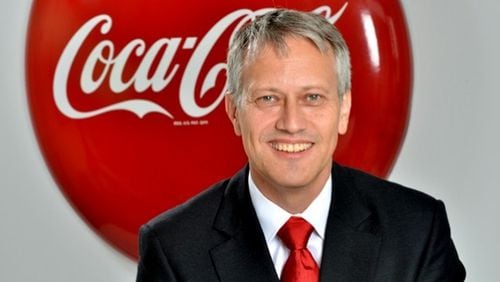James Quincey, tapped Friday to become Coca-Cola’s next chief executive, is described as a veteran company executive who will bring a smooth change in leadership and keep re-tooling the beverage giant as it grapples with changing consumer tastes.
Quincey is the “absolute ideal” choice for the top job, said outgoing CEO Muhtar Kent, who will step down May 1.
“The board and I are absolutely certain he is prepared,” Kent said of Quincey, 51, who became the heir apparent as CEO when he was named Coke’s president and chief operating officer 19 months ago. Kent will remain chairman of the board.
The move was expected and leaves the Atlanta company “in good hands,” Wells Fargo analyst Bonnie Herzog said.
“Quincey is a great leader and highly regarded throughout the company. We expect this leadership transition to be smooth given Quincey’s intricate involvement with (Coke’s) new strategic direction,” Herzog said.
Kent has been CEO since 2008. He had started at Coca-Cola in 1978 and spent much of his career in the company’s international operations. Earlier this year, Kent was on a long list of people reportedly being considered as a potential vice presidential candidate to be Hillary Clinton’s running mate.
Quincey said he plans to continue strategies rolled out during Kent’s tenure, including an ongoing campaign to shed bottling operations Coke owns and to revamp franchise bottlers around the globe.
“I think we’ve got a full agenda,” he said in a conference call with reporters.
He said Coke will continue efforts to offset slowing consumer demand for traditional sodas. Those efforts include new drinks based on coffee, juices, milk, plant protein drinks and other new beverages, many bought or developed in overseas markets.
“We’ve got one of the most iconic brands because we’ve always stayed relevant for consumers for 130 years,” he said.
Coke also has pushed smaller sized soda servings that are more profitable.
The soda business has struggled as more people switch to teas, water and energy drinks. Anti-obesity advocates have criticized sugary beverages, and campaigns for "soda taxes" have popped up in a few cities.
Born in London, Quincey studied electrical engineering at the University of Liverpool and worked as a consultant at Bain and McKinsey in the United Kingdom before joining Coca-Cola in Atlanta in 1996.
Bi-lingual in English and Spanish, Quincey gained notice as he headed various units in Latin America and Europe.
Coke said Quincey, as president of the Mexico Division from 2005 to 2008, helped grow market share at the unit and led the acquisition of Jugos de Valle, one of 20 Coke brands that generates more than $1 billion in revenues.
As president of the European Group, Quincey headed Coke’s most profitable unit, the company said.
Quincey has “exceptional capabilities” and experience acquiring and developing brands that have “reinvigorated growth in many of (Coca-Cola’s) largest regions,” Herzog said in an analyst note.
When the 20-year Coke veteran arrived back at the company’s Atlanta headquarters in 2015, he upended an apparent horse race for the top job. Kent had divided the company into three groups, headed by three executives who reported to him.
After Coca-Cola’s board named Quincey as second-in-command, Ahmet Bozer, the head of the international group, retired at age 55. Quincey became boss over two other apparent contenders, North American chief Sandy Douglas and Irial Finan, president of the bottling unit, who previously reported to Kent.
After Quincey’s arrival, Coca-Cola also sped up efforts to undo the effects of a huge 2010 deal in which it had acquired Atlanta-based Coca-Cola Enterprises’ North American bottling operations for $12 billion. At the time, Kent said the deal would allow Coca-Cola to make its largest bottler operation more flexible and efficient.
But by late 2013, Coca-Cola was reorganizing the operation again. Steve Cahillane, the head of the unit and another apparent CEO contender, left the company. Coke later began selling its bottling units to independent bottlers.
Earlier this year, Quincey and Kent said the company was accelerating the refranchising effort, to complete it by the end of next year rather than by 2020.
Staff reporter Kelly Yamanouchi contributed to this report.
James Quincey
New job: CEO at Coca-Cola, starting May 1
Current job: Coke's president and chief operating officer since August 2015
Age: 51
Background: Born in London. Lived in Hanover, N.H., as a child for three years, when his father was a biochemistry lecturer at Dartmouth.
Education: Degree in electronic engineering from University of Liverpool
First job at Coca-Cola: Hired in 1996 in Atlanta as Director of Learning Strategy for Coca-Cola's Latin America Group.






